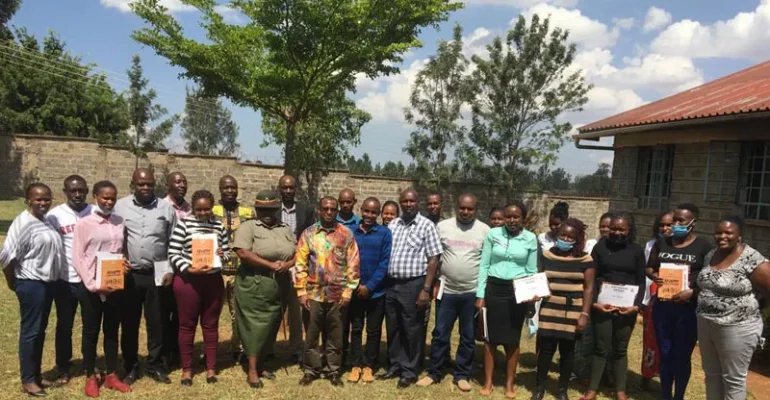By Agnes Aineah
Nairobi, 07 December, 2021 / 11:00 pm (ACI Africa).
More than 20 prison officers who oversee the custody of hundreds of young people in juvenile correctional facilities in Kenya have successfully completed training to help them instill important life skills in young offenders.
In a report shared with ACI Africa on Monday December 6, Father Matambura Ismael, member of the Jesuit Conference of Africa and Madagascar (JCAM) and Director of the African Jesuit AIDS Network (AJAN) stated that the goal of this three-day training was to equip prison officers with skills to guide young people to lead morally upright and successful lives once they have left prison.
“While the job of prison officers is primarily to ensure that young people stay safe in detention, AJAN intended to reach out to officers to give them life skills that will further prepare them for their role, especially to instill in them the thoughtful intention of having a real positive impact on the lives of young people, “said Father Matambura of the initiative that took place last month.
The two institutions that participated in the AJAN program for the prevention of HIV and AIDS for young people (Generation AHAPPY) are the Kamae Girls Borstal institution, which deals with young women offenders, and the Youth Corrective and Training Center (YCTC) of Kamiti Maximum Prison, Nairobi.
According to Father Matambura, AJAN’s agenda this year has been to work towards a process where young people can be able to “see all new things in Christ”.
The agenda is set up in different ways, says the Jesuit priest in the report he shared with ACI Africa, and he explains: “It can be that of a trainer, or that of a learner. young people means preparing the people who are in direct contact with them. They are teachers, catechists and others. This time it was the prison officers. “
In June, AJAN officials organized a similar training course aimed at giving prison catechists the knowledge and skills they need to accompany young people in prison establishments.
The three-day training, spread over three weeks, brought together 23 catechists, most of them uniformed police officers working in various prisons in Nairobi County.
Representatives of the June training which targeted the Nairobi region came from Lang’ata Women’s Prison, Nairobi West Prison, Industrial Zone Remand and Dispatch Prison, Maximum Prison Kamiti, Kiambu Prison, Ruiru Prison and Prison Staff Training College.
Correctional establishments for minors were represented by catechists from the correctional and training center for young people of Kamae and Kamiti prisons.
Developed in 2012 to respond to the challenge of HIV / AIDS among young people through the Generation AHAPPY program, the training has since evolved to include instilling values in young people and guide them in their interpersonal relationships.
In their report dated November 24 which was shared with ACI Africa on December 6, AJAN officials note that the three-day training that ended on November 24 was organized around the modules of the Generation AHAPPY manual.
The manual, which was developed into a 232-page book, has three themes that guide users toward self-awareness and discovering God’s purpose in their lives. In the second part, users learn to appreciate their environment and build relationships with others. Finally, in the third part, they acquire the values and skills necessary to cope with their difficult environment.
“The purpose of the manual is to help young people lead happy lives, regardless of the environment in which they find themselves,” says Father Matambura, who adds: “It is about learning to live happily in a broken society, taking care of others and not exploiting them.”
This manual has been designed to help prison staff understand the five dimensions of the human being that are “central to the integral development of young people, as guided by the Jesuit principle of cura personalis”.
“The Ignatian principle of cura personalis, which implies genuine love and personal attention for young people, is at the origin of Generation AHAPPY,” Father Matambura said in a previous interview with ACI Africa, and explained: “It addresses the integral formation of the young person through the Ignatian paradigm that gives preeminence to the constant interaction between experience, reflection and action.”
The Jesuit priest from the Democratic Republic of Congo (DRC) said in the June interview that the result of the formation is “a complete young person who lives and grows to the best of his ability, and who works for the good of others and the improvement of his continent.”
“In the context of young people who are in conflict with the law, society and themselves, the effort to see all things again in Christ impels us to see the young person behind bars, not as defined by his present state, but as a human person, God’s beloved creature, with dreams, talents, hopes and the ability to realize them,” the Jesuit priest said, referring to the mantra of St. Ignatius of Loyola, “to see all things again in Christ.”
In the report shared with ACI Africa on December 6, Evans Odhiambo, a youth welfare officer at the YCTC, notes that last month’s training has been helpful in his work with young offenders.
- Odhiambo says: “This training helped me change my mind about how to treat boys. I’m more concerned about the emotional side of the boys. I now understand that it’s good to take the time to listen to the boys and understand them in depth before you even make efforts to help them make positive changes.”

